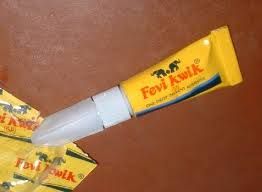 Pidilite’s new campaign for its instant adhesive brand, Fevikwik, tries to broaden its appeal beyond the core audience segment
Pidilite’s new campaign for its instant adhesive brand, Fevikwik, tries to broaden its appeal beyond the core audience segment
If there is a company out there that embodies the effectiveness of using humour in marketing, it is Pidilite Industries.
In a new campaign for its instant adhesive brand, Fevikwik, the company gives out a simple message in a fun way: For a broken heart, we have no solution. For everything else, there is Fevikwik.
The campaign titled ‘Broken Heart’, which broke on television earlier this week, comprises two films -- ‘Sandal and mug’ and ‘Toy and chashma’.
The films are based on the experiences of a hopelessly romantic guy, who can’t express his emotions properly and ends up with a broken heart.
‘Sandal and mug’ shows him getting smitten by a woman in a marketplace who hits him with her sandal, breaking it in the process.
When he is taken to the hospital, he falls for a nurse who, instead of sympathising with him, breaks her mug on his head.
Both the times, bystanders advise the women in question to use Fevikwik to fix the objects; for his heart, unfortunately, there is no quick-fix.
The man’s adventures continue in the ‘Toy and chashma’ ad. He is hit on the head with a kid’s toy and then slapped by a woman, who manages to break his sunglasses.
This time also, people around him break into a song advising Fevikwik for the broken toy and glasses and ‘Pyaun-pyaun’ -- a term coined by the team to represent zilch -- for him.
The new advertising campaign, says the company, is aimed at broadening the brand’s appeal beyond its established position as a ‘one-drop instant adhesive’.
Staying true to tradition, it uses huge dollops of humour to showcase Fevikwik’s versatility as an adhesive that can be used to fix a whole host of objects -- from toys to sunglasses.
By increasing the usage occasions -- moving from professional use to home use to being an all-purpose fixer -- the company’s hopes to broaden the brand’s appeal beyond its core target.
Says Vivek Sharma, chief marketing officer, Pidilite Industries, “Fevikwik has established itself as a leader in the instant adhesives market with the proposition of chutki mein chipkaye and we are simply building on that by depicting funny situations where the brand can step in to mend things.”
The campaign was aired on October 11 during the television premiere of Bollywood blockbusters Bajrangi Bhaijaan and Tanu Weds Manu Returns. The ad will also be aired across key Hindi-speaking and regional markets.
Sharma says Fevikwik enjoys instant recognition in the instant adhesive market in India, though he refuses to give an idea about the size of the market or the share of Fevikwik in it.
In fact, there are no uniform estimates available for the size of the adhesives and sealants market in India as it is highly fragmented, with a large number of players presiding over local pockets.
However, one industry review report estimates the adhesive market at 5,000 tonnes per month in volume and about Rs 60 billion a year in value.
Reports also say that given the low per capita consumption in the country -- it stands at Rs 50 compared to Rs 750 in USA, Japan and South Korea combined -- there’s a huge market waiting to be tapped and branded and that a handful of international companies are already getting increasingly assertive. Does that worry the company? Sharma says not at all.
That is because Pidilite enjoys a leadership position (with over 60 per cent share) both in the Indian adhesives market as well as the instant adhesive category (80 per cent share).
Apart from Pidilite, the other recognisable brands in the market are 3M India, Huntsman, National Starch, Bostik Findley. Huntsman, with its brand, Carpenter, is considered by some analysts as the closest rival to the company is the furniture segment, the largest consumer of adhesives.
Sharma says that the new campaign aims to target young people by urging them to reuse and recycle products.
“You can use and throw or you can mend and reuse. And that is where an instant adhesive will come in handy,” he explains.
To woo this segment the company has planned a social media campaign with the hashtag Pyaun-pyaun.
The campaign will aim to initiate a conversation around “what one can and what one cannot do” with Fevikwik.
The common strain that will tie the campaign spanning television, radio and digital will be humour.
It is pertinent to add here that humour has been the cornerstone of most Pidilite brand advertising.
Analysts say humour lends itself well to brands in highly competitive or saturated industries.
By using humour in their marketing, companies that sell arguably 'boring' products have transformed the way consumers perceive them. In addition to providing simple entertainment, ready wit can have a humanising effect on a brand.
The only thing to remember here is that it’s a tricky balance.
Too many companies have found that flippant social media posts can backfire or even kick up a storm.
The best brands blend humour into their 'real' personality keeping the audience above everything else.









